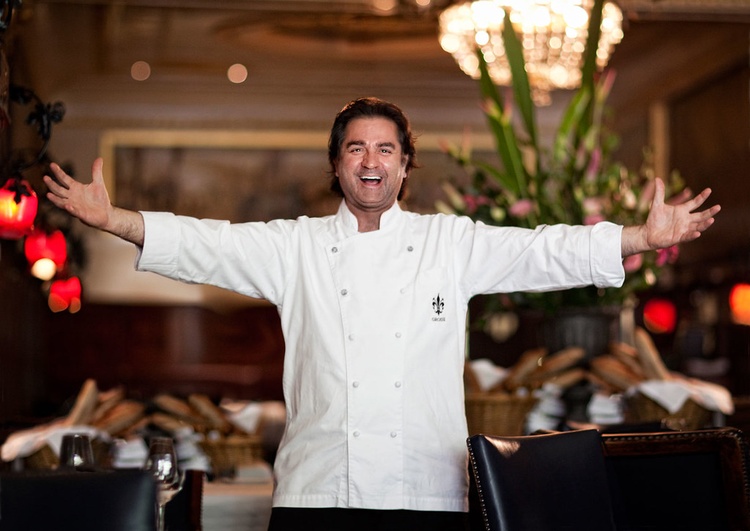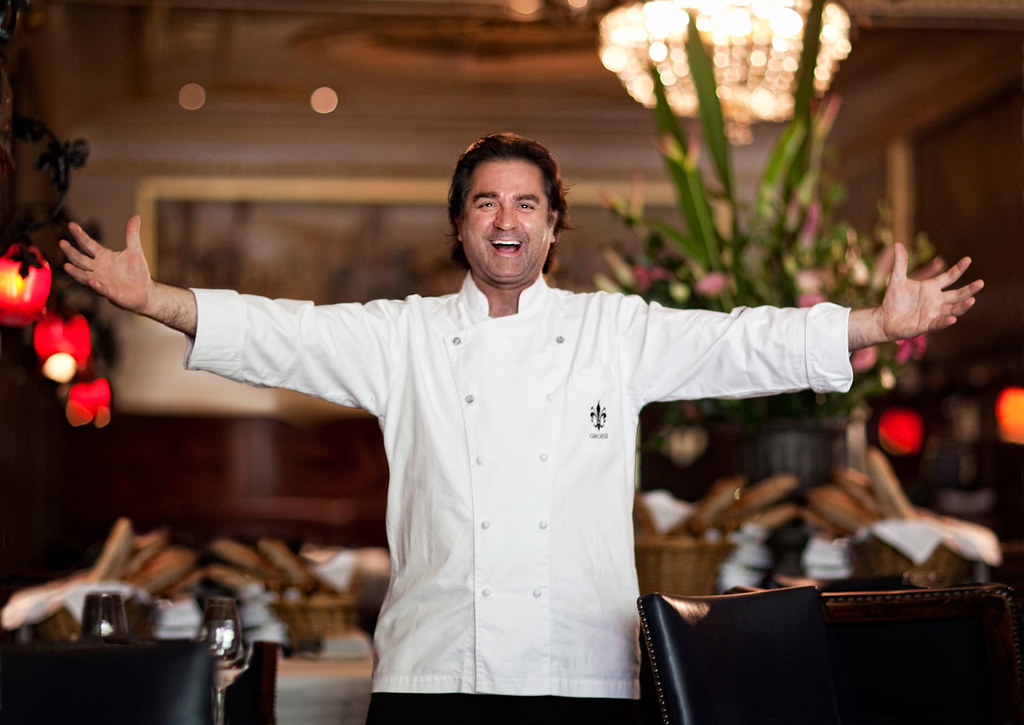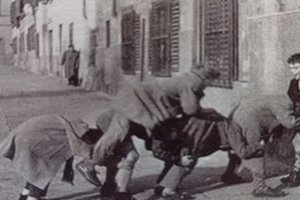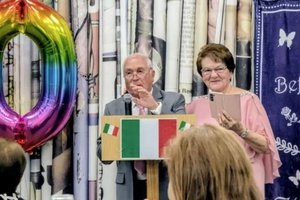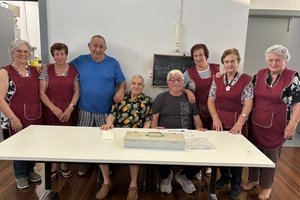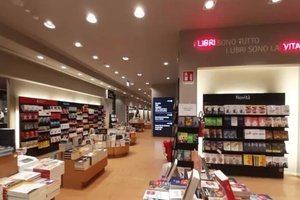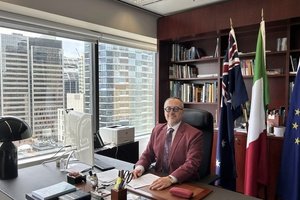In the 1920s and 1930s, Melbourne’s restaurants were dominated by Italians.
Samuel Wynn of the famous Coonawarra Estate took over Cafe Denat (which would later evolve into Café Florentino) and moved it to Bourke Street in 1925.
In his biography, The Fortunes of Samuel Wynn – Winemaker, Humanist, Zionis, his son Allan Wynn writes that, at the time, Melbourne’s “café society” was based on five clubs: Molina’s, Café d’Italia (later, The Latin), The Society, Café Florentino and Marios.
Located originally at 78 Bourke Street, the four-room red brick house was first registered in 1853, but the history of the restaurant began in 1918, when Samuel Wynn bought the building and opened a wine store.
Wynn lived with his family on the first floor of the building, where their presence is still felt today – one of Grossi Florentino’s dining rooms is named after them.
In 1925, Wynn took over Cafe Denat, moving it Bourke Street, and employing a host of new chefs, including Ernesto Molina.
Rinaldo Massoni, an Italian migrant who arrived in Australia from the Tuscan city of Lucca in 1911, managed to persuade Wynn to change both the name of the restaurant and its cuisine.
In 1929, it was rebaptised Café Florentino and became an Italian restaurant.
By the mid-1930s, the restaurant had gained a large clientele, with politicians and businessmen regularly dining there.
In 1935, the adjacent building was purchased and the two shops joined together, while the dining room on the first floor was extended and modernised in time for Australia’s 150th birthday celebrations.
The new upstairs dining room was extensively decorated to a design by Walter Butler, with eight murals created by pupils of noted artist Napier Waller; this room was christened The Mural Room.
The Grossi family has since restored the murals to their former splendour, with the delicate work being carried out by the University of Melbourne and the Ian Potter Museum of Art.
In the elegant dining room, with wrought iron lighting by Emilio Gavotto and ceiling work created by Picton Hopkins, each table had its own telephone.
In 1999, Guy Grossi bought Café Florentino from Lorraine Podgornik, who in turn had owned it for around a decade.
“I heard a rumour that it was on the market, so I approached her and about 12 months later we did the deal,” Grossi said in an interview with Rete Italia.
Grossi began his career as an apprentice at Two Faces, under the guidance of the late Hermann Schneider.
Ironically, he was also offered a position at Café Florentino but, when he received a telegram saying he’d got the job at Two Faces, he had no hesitation in accepting.
Grossi went on to work at some of Melbourne’s top restaurants, before opening Quadri with his wife Melissa, then Epoca, and Café Grossi, with his father Pietro.
“I took my mother back to Italy, but my father decided he was never going to go back because this was his home and he didn’t want to have to feel sad about leaving his family again,” Grossi said.
Grossi points out that taking over one of Melbourne’s most iconic Italian restaurants was a great responsibility, due to its long legacy.
“Still today, we have people who have been coming here for decades,” he said.
“We’ve done a lot of things to put our own stamp on the place, but we’re always very conscious to make changes subtly and in a very sensitive manner towards our guests, especially those ones who’ve been coming for a long time.”
Over the years, Grossi has opened other venues, including Merchant, located in The Rialto, which he sold after the last lockdown to focus on the northern area of the CBD where, in addition to Grossi Florentino, he also has: Ombra, a salumi bar run by his son Carlo; and Arlechin, a late-night bar which recently reopened following months of lockdown.
“It’s really nice to see the people of Melbourne out enjoying themselves and a lot of them are really trying to spoil themselves; we went through a lot and they’re really enjoying the fact that now they can come and be with friends,” Grossi said.
“As Italians and Victorians, we love to socialise and eat and drink... it’s our sport!”
The lockdown was a difficult time for everyone, particularly those in the hospitality industry.
“Hospitality did it very tough; it went from having a turnover to no turnover,” Grossi said.
“We were lucky to do Grossi A Casa, which is a brand that we’ve still got going now because we developed a business model out of it.
“That and the generosity of our guests... our suppliers...and our landlords...kept us going.
“The community of restaurateurs was very strong; we all joined a chat group and we kept in touch with each other on a daily basis, sharing information about what was going on.”
For Grossi, however, the most difficult thing was losing his team of international chefs, waiters and sommeliers, who suddenly found themselves without a job.
“With the way the law was with immigrants, they weren’t looked after,” Grossi said.
“Unfortunately, we lost a lot of them; they had to go back home because they had nothing to do and no way of being able to sustain themselves, which has now put the industry into a very precarious situation with a real shortage of skills in this country.”
Almost four years ago, the group headed by Grossi opened a restaurant in Western Australia, called Garum, located inside The Westin Perth.
“Garum sits in a hall called Hibernian Hall, which is the Latin name for the Irish,” Grossi said.
“We decided to open a Roman-style restaurant because it truly looks like a Roman building; it’s got really beautiful bones and character to it.”
When asked if opening numerous restaurants affects the level of quality, Grossi replied that it becomes slightly more complicated, but that it all depends on the team that you surround yourself with.
“I remember the great chef Alain Ducasse’s reply when he was asked in an interview: ‘Who cooks in your restaurant when you’re not there?’,” he recalled.
“[Ducasse] said: ‘The same people who cook when I am there’.
“You have to have good people in every part of your business and I think that’s the same with any business.”
Grossi concluded the interview by paying tribute to his first boss in the industry, Hermann Schneider, who passed away last month.
“Mr Schneider, as we used to call him, was an amazing man and he was very talented,” Grossi said.
“He was very strict in the kitchen, but for good reasons; he wanted to teach us the right way of doing things.
“He had a very beautiful sense of humour and he taught me lots of things; he taught me to believe in myself, to always try to do better, and to never just accept the way things are.”
Grossi now embodies these values, and is passing them on to a new generation of aspiring chefs.

